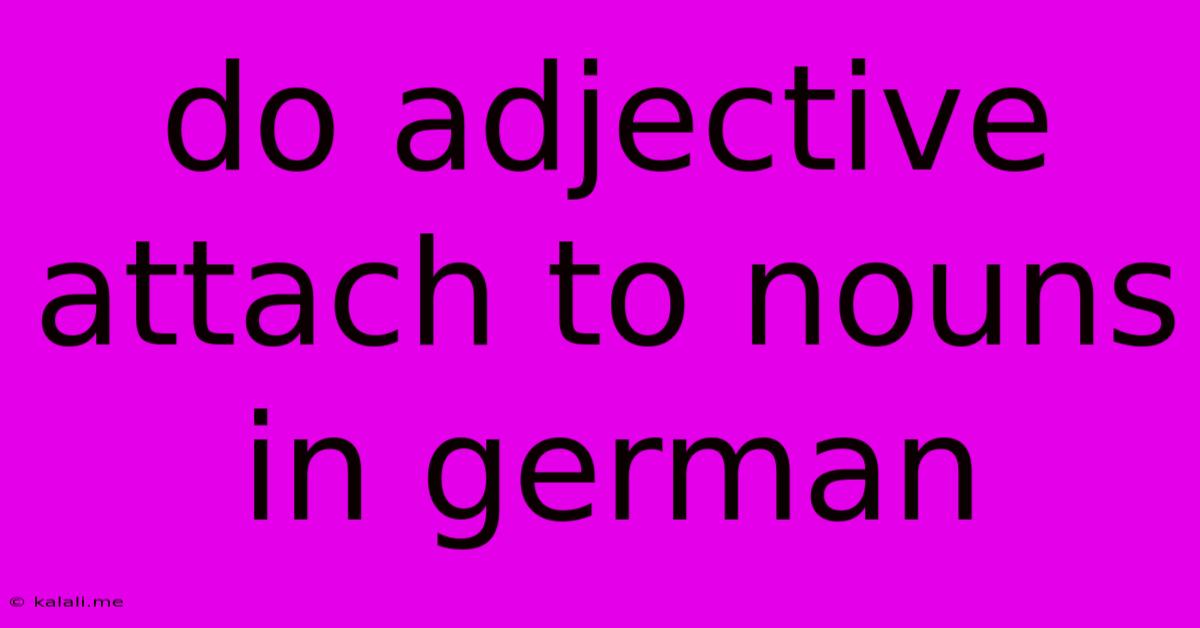Do Adjective Attach To Nouns In German
Kalali
Jun 03, 2025 · 3 min read

Table of Contents
Do Adjectives Attach to Nouns in German? A Comprehensive Guide
Meta Description: Learn how German adjectives modify nouns, exploring declension, gender agreement, and the role of adjective endings. Master this crucial aspect of German grammar!
German grammar can seem daunting, particularly for English speakers accustomed to a simpler adjective system. One key difference lies in how adjectives relate to nouns. Unlike English, where adjectives typically remain unchanged regardless of the noun they modify, German adjectives change their form depending on the noun's gender, case, and number. This process is known as adjective declension. Understanding adjective declension is crucial for speaking and writing grammatically correct German.
Understanding Adjective Endings in German
The core of adjective-noun agreement lies in the adjective endings. These endings reflect the grammatical context:
- Gender: German nouns have three genders: masculine (der), feminine (die), and neuter (das). The adjective ending changes accordingly.
- Case: German has four cases: nominative (subject), accusative (direct object), dative (indirect object), and genitive (possessive). Each case necessitates a different adjective ending.
- Number: Singular and plural forms require distinct adjective endings.
The Strong and Weak Declension of Adjectives
German adjectives follow either strong or weak declension, determined by the presence or absence of a determiner (articles, possessive pronouns, demonstrative pronouns, etc.) before the adjective.
-
Strong Declension: This occurs when the adjective is not preceded by a determiner. The adjective carries the full grammatical burden, showing the gender, case, and number through its endings. This results in more complex and varied endings.
-
Weak Declension: This occurs when the adjective is preceded by a determiner. The determiner indicates the gender, case, and number, leaving the adjective with simpler, often -en endings.
Examples of Adjective Declension
Let's illustrate with the adjective "groß" (big):
Masculine (der Mann - the man):
| Case | Strong Declension | Weak Declension (with "der" - the) |
|---|---|---|
| Nominative | großer Mann | der große Mann |
| Accusative | großen Mann | den großen Mann |
| Dative | großem Mann | dem großen Mann |
| Genitive | großen Mannes | des großen Mannes |
Feminine (die Frau - the woman):
| Case | Strong Declension | Weak Declension (with "die" - the) |
|---|---|---|
| Nominative | große Frau | die große Frau |
| Accusative | große Frau | die große Frau |
| Dative | großer Frau | der großen Frau |
| Genitive | großer Frau | der großen Frau |
Neuter (das Haus - the house):
| Case | Strong Declension | Weak Declension (with "das" - the) |
|---|---|---|
| Nominative | großes Haus | das große Haus |
| Accusative | großes Haus | das große Haus |
| Dative | großem Haus | dem großen Haus |
| Genitive | großen Hauses | des großen Hauses |
Mastering Adjective Declension: Tips and Resources
Learning adjective declension requires practice and memorization. Here are some helpful tips:
- Focus on patterns: Notice the similarities and differences in adjective endings across genders, cases, and numbers.
- Use flashcards: Create flashcards with examples of adjectives in different declensions.
- Practice with sentences: Construct sentences using various adjectives and nouns to solidify your understanding.
- Utilize online resources: Many websites and apps offer interactive exercises and quizzes on German adjective declension.
By understanding the rules of adjective declension, you'll significantly improve your ability to construct grammatically correct and fluent German sentences. It's a crucial step in mastering this beautiful and complex language. Remember consistent practice is key to mastering this aspect of German grammar.
Latest Posts
Latest Posts
-
New Super Mario Bros Wii Mushroom House Cheats
Jun 05, 2025
-
How Do You Secure A Dishwasher
Jun 05, 2025
-
Civ 6 Timer Turn Off After Game Started
Jun 05, 2025
-
What To Treat Shed Floor With
Jun 05, 2025
-
Element Wise Prediction Numpy Between Two Arrays
Jun 05, 2025
Related Post
Thank you for visiting our website which covers about Do Adjective Attach To Nouns In German . We hope the information provided has been useful to you. Feel free to contact us if you have any questions or need further assistance. See you next time and don't miss to bookmark.